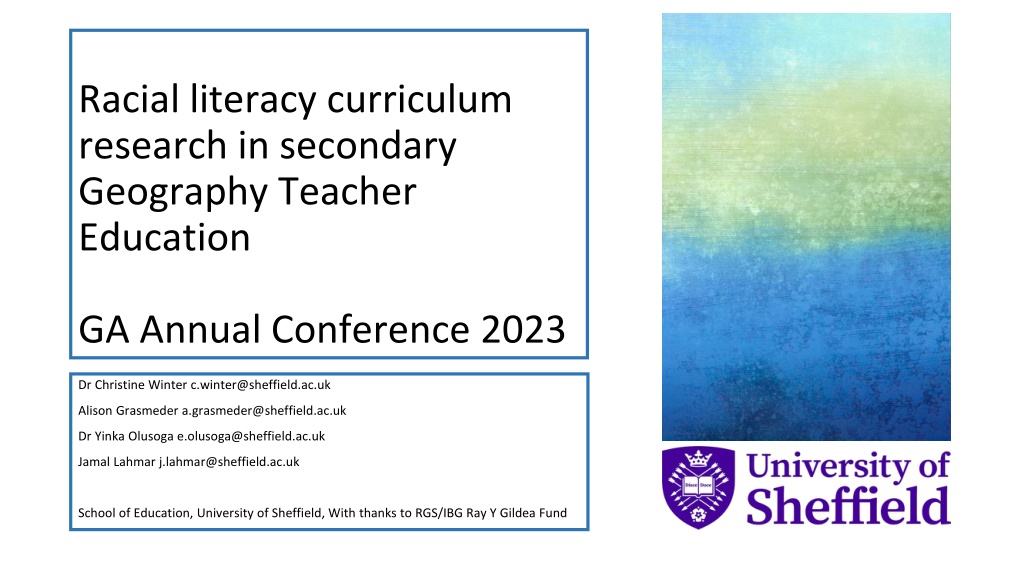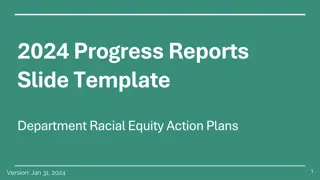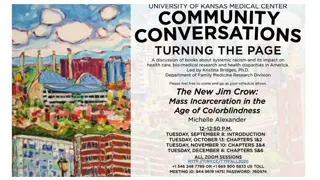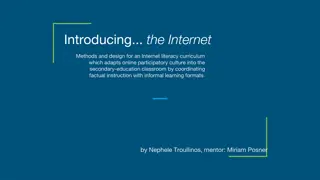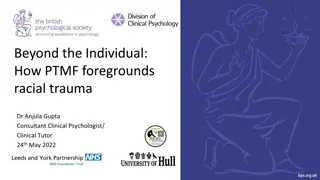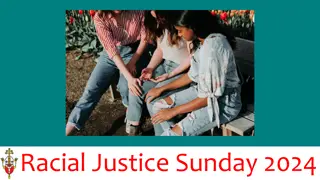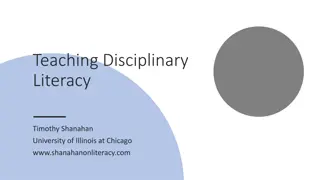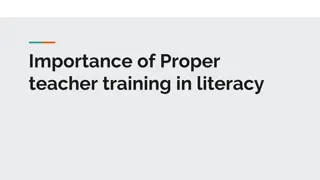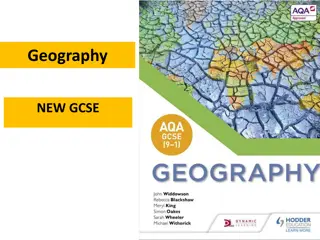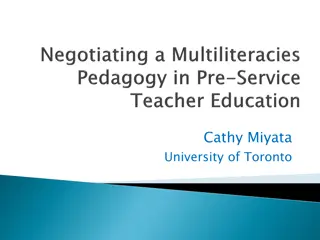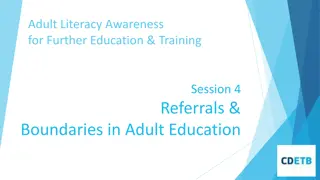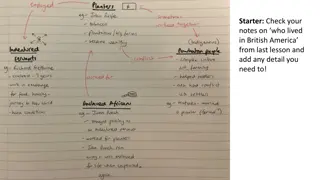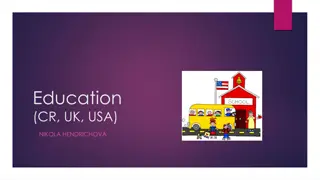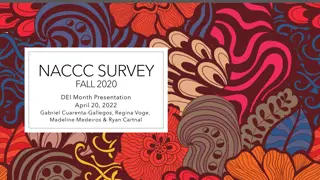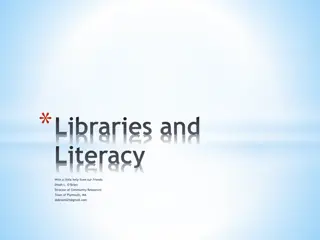Exploring Racial Literacy in Secondary Geography Teacher Education
This research project at the University of Sheffield aims to address the neglect of racial literacy in initial teacher training. By exploring student teachers' perspectives, introducing anti-racist approaches, and developing resources, the study seeks to enhance awareness and critique of racism in school geography curricula. The methodology involves interviews, teaching sessions, and thematic analysis to challenge the historical biases in geography education.
Download Presentation

Please find below an Image/Link to download the presentation.
The content on the website is provided AS IS for your information and personal use only. It may not be sold, licensed, or shared on other websites without obtaining consent from the author. Download presentation by click this link. If you encounter any issues during the download, it is possible that the publisher has removed the file from their server.
E N D
Presentation Transcript
Racial literacy curriculum research in secondary Geography Teacher Education GA Annual Conference 2023 Dr Christine Winter c.winter@sheffield.ac.uk Alison Grasmeder a.grasmeder@sheffield.ac.uk Dr Yinka Olusoga e.olusoga@sheffield.ac.uk Jamal Lahmar j.lahmar@sheffield.ac.uk School of Education, University of Sheffield, With thanks to RGS/IBG Ray Y Gildea Fund
Project context Initial issues raised by student teachers in 2018 EAL, BAME and racial literacy are not mentioned in ITT policy (eg CCF, ECF or EIF) Low level global majority representation in geography teaching profession Black Lives Matter: increased discussion of identity amongst young people Media influence in culture wars Research identifies that racial literacy is neglected in ITE
Project objectives 1. To explore geography students perspectives on the white school geography curriculum 2. To introduce and develop University teaching sessions identifying and critiquing racism in school geography 3. To examine and evaluate anti-racist approaches to teaching geography 4. To evaluate geography students responses to a curriculum assignment innovation which focused specifically on resources and their critical development 5. To develop anti-racist teaching resources appropriate to students placement schools
Methods - data collection and analysis Stage Activity 1 Individual interviews with 6 geography student teachers. This included discussion of images from published resources that had been used for classroom-based teaching Teaching session 1: introduce the new racial literacy assignment Consider issues relating to whiteness in the geography GCSE curriculum in England 2 3 Student teachers identify a potential white geography issue in a teaching resource in school Teaching session 2: student teachers bring their white geography issue and alternative examples for discussion Individual interviews with 5 geography student teachers to investigate their responses to the 2 teaching sessions and the new assignment Individual interview with a geography mentor 4 5 6 7 Thematic analysis of data from interviews and assignments
Theoretical frame Curriculum is predominantly constitutive of the knowledge and values of particular interest and power groups (Kanu, 2009, p. 5) Race has no genetic/biological foundation; it is a social and political construction (Leonardo, 2009, p. 41) Geography s white colonial history and epistemology (Kobayashi & Peake, 1994) Racialisation constructs non-dominant groups as having different value from dominant groups (Pulido, 2017) Racialising assemblages /devices (Wehelyie, 2014) Pedagogies of discomfort Zembylas, 2014; Bryan, 2012, 2016; Rajah et al, 2022; Boler & Zembylas, 2003.
School geographys racialising devices economic focus erasure of colonial history LICs are politically unstable (war-torn) trivialisation (cartoons) myths (Africa lacks natural resources) dependency language clothes stereotypes binaries mis-representation (colonialism) comparison West is Best de-contextualisation Islamophobia environmental determinism white saviourism victims & villains
Student teacher selection of a geography textbook resource (Gallagher & Parish 2002)
Pedagogies of discomfort: people are scared to talk about race Int: What was your first reaction when this Racial Literacy assignment, was introduced to you? School mentor: Panic. Yes, because the second anybody says anything like that, it seems like it s one of the most serious things that we cover at school. It s one of those taboo topics, if so. And it s something that s so important, you want to get it right. You don t want to get it wrong. You re scared of saying something wrong (p. 1). Int: Why do you think racial literacy has not been embedded into PGCE or PGDE or IT courses earlier? Student: Possibly because people are scared to talk about it, maybe. There s a certain, not stigma, but a fear around saying the wrong thing and discussing it. So, I think that might be a fear of saying something wrong, saying something controversial. I think people are often scared they re going to say the wrong thing (RL 2 2 Code 8 p. 7).
Fig 4 RL5: It s not really geography is it? It s not showing the development gap which I think. I m not a big fan of maths, but statistics would be better there or images about cities and urban sprawl. You could take the people out of it, couldn t you, and you could just have cars. So you could have how many cars are in Manchester compared to how many cars are in Lagos. RL6: could lead onto again that overgeneralisation of nations and to think that well, the white man s got all these things so that s obviously the best way to be and the best way to go about living our lives. But this poor African girl s got nothing and she s barely got any clothing so who wants to be like that. RL6: because it s a cartoon it almost makes it trivial, it almost makes it joke-like. Like if .I was a not well educated child and I saw this image I think my first reaction would just to be like ha ha, like to laugh at it. RL6: It depersonalises the issues with these indifferences and yes, it could lead to, again, just white students or white people thinking that that s the way to be and that any other way of living is just not right. So it could lead to perhaps bullying or like again leaving certain demographics out of social activities and such
RL3: I imagine they [Malawian students] would be a bit uncomfortable with that and then thinking like oh, what do my other classmates think of me now and stuff like that. RL6: I guess it could perhaps lead to bullying in a sense, because children at that age are quite young and quite easy to encourage to follow whatever, a leader. So if somebody s like oh, look at her so poor and laughing at this kind of thing it might make these Malawian students feel like ostracised or not part of the school community. So it could lead to further implications not just in the lesson but within a school social structure. Fig 1: Girl in Well RL6: the fact that she looks helpless and weirdly it could almost give a white person this feeling of power in a sense. Like oh, I m not in the well I m not having to collect water from the bottom of this well so it could almost make people feel better about the situations they re in but ostracise the people that are going through this particular kind of situation. RL6: It would perhaps make, I don t know, make the white kids a bit more like oh well, these kids are poor we don t want to hang out with these kind of children. So it could lead to these kind of divisions within the school, not just within the lesson itself but further afield.
The power of visual examples of racialised discourse Race as a system of reasoning that is (re)produced and circulated via discourse Discourse: the habitual ways in which language (spoken, written, visual, etc) is used to name, characterise and frame people and groups and make arguments about their relation to each other Discourse is a set of language tools/lenses that exercise power Stopping to analyse these images is emotionally unsettling It makes us notice the layers of racialising discourse at work Emotionally unsettling Shame? Guilt? Superiority? Fear of imminent danger of losing control Bullying Emotional overspill beyond the lesson/classroom
Emotional responses of student teachers to school geography narratives and practices Vignettes: Censorship of geographical knowledge Whose voice?: Lampedusa migration Instrumentalising conflict for recruitment purposes Personal involvement of minoritized pupils in lessons Avoiding the language of race Pupil resistance: putting the student teacher on the spot Post-race attitudes Compliance a) b) c) d) e) f) g) h)
Anti-Racism as a Knowledge Project Rajah et al (2022) make the case that discomfort is often the starting point and an important mechanism to push knowledge projects forward (p. 557) We need to be prepared to be unsettled and confronted To be prepared to have our practices and authority challenged and to be seen to not know all of the answers In order to engage in this work we need to reframe discomfort and understand it as feedback As something we anticipate and deal with, rather than avoid entirely Africa Unfair Trade Mining Minerals by Polyp
Challenge, resist and reframe discomfort A culture of critical and collaborative reflection through communities of practice (Lave and Wenger, 1991) developing through space and time. Mentor training e.g. the social justice model (Duckworth and Maxwell, 2015). Input into ITE programme e.g. taught sessions on racial literacy Racial literacy assignment - reflection in action and on action (Sch n, 1983) Self and/or collaborative reflection related to teacher identity - supportive resource
A resource for mentors and student teachers What is helpful? What might be added? What could be removed? What else might need to be considered?
References Boler, M. and Zembylas, M. (2002). Discomforting Truths: The Emotional Terrain of Understanding Difference in Peter Pericles Trifonas (Ed.) Pedagogies of Difference : Rethinking Education for Social Justice. London: Taylor & Francis. Bryan, A. (2012). You ve got to teach people that racism is wrong and then they won t be racist : curricular representations and young people s understanding of race and racism. Journal of Curriculum Studies 44(5), 599-629. Bryan, A. (2016). The sociology classroom as a pedagogical site of discomfort: Difficult knowledge and the emotional dynamics of teaching and learning. Irish Journal of Sociology 24(1), pp.7-33. Duckworth, V., and Maxwell, B. (2015). Extending the mentor role in initial teacher education: embracing social justice. International Journal of Mentoring and Coaching in Education, 4(1), pp.4 20. Kanu, Y. (2009). Introduction. In Yatta Kanu (Ed.) Curriculum as cultural practice: postcolonial imaginations. Toronto: University of Toronto. pp.3-29. Kobayashi, A and Peake, L. (1994). Unnatural discourse: race and gender in geography. Gender, Place and Culture: A Journal of Feminist Geography 1,(2), pp.225-243.
References Lave, J. & Wenger, E. (1991). Situated learning: legitimate peripheral participation. Cambridge: Cambridge University Press. Leonardo, Z. (2009). Race, whiteness, and education. London: Routledge. Pulido, L. (2017). Geographies of race and ethnicity environmental racism, racial capitalism and state-sanctioned violence. Progress in Human Geography 41(4), 524-533. Rajah, V., Palmer, J. and Duggan, M. (2022). The Personal is Political and so is Discomfort: Intersectional, Anti-Racist Praxis in Feminist Criminology, Race and Justice, 12 (3), 548-568. Sch n, D.A. (1983). The Reflective Practitioner. How Professionals Think in Action. Basic Books.USA. Wehelyie, A. (2014). Habeas Viscus: racialising assemblages, biopolitics and black feminist theories of the human. London: Duke University Press. Zembylas, M. (2014). Theorizing Difficult Knowledge in the Aftermath of the Affective Turn : Implications for Curriculum and Pedagogy in Handling Traumatic Representations. Curriculum Inquiry 44(3), 390-412.
Dr Christine Winter c.winter@sheffield.ac.uk Our Contact Details Alison Grasmeder a.grasmeder@sheffield.ac.uk Dr Yinka Olusoga e.olusoga@sheffield.ac.uk Jamal Lahmar j.lahmar@sheffield.ac.uk
